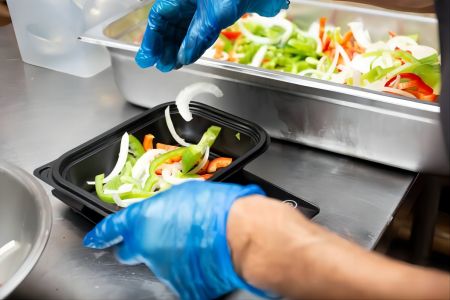Vinyl vs Nitrile Gloves for Food
Published on 2023/8/16

Share to:
Vinyl vs Nitrile Gloves for Food
Choosing the right gloves for food-related activities requires careful consideration of the specific needs and priorities of your business. Vinyl gloves offer affordability and flexibility, while nitrile gloves provide superior strength and barrier protection.
In the food industry, ensuring the highest standards of hygiene is crucial to safeguarding public health. Gloves play a vital role in maintaining cleanliness, protecting both food handlers and consumers from potential contamination. When it comes to choosing the right gloves, the debate between vinyl and nitrile gloves has gained considerable attention. This article aims to explore the characteristics, advantages, and disadvantages of both types, helping you make an informed decision for your food-related activities.
1. Vinyl Gloves:
Vinyl gloves are widely used in food handling due to their affordability and flexibility. These gloves are made from synthetic PVC (polyvinyl chloride) materials, making them an economical choice for businesses with high glove turnover rates. Here are some key features of vinyl gloves:
a. Cost-effective: Vinyl gloves are generally more affordable than nitrile gloves, making them suitable for budget-conscious businesses.
b. Comfortable fit: Vinyl gloves offer better flexibility, allowing for a comfortable fit and ease of movement during food preparation tasks.
c. Latex-free: Vinyl gloves are suitable for individuals with latex allergies, ensuring a safe working environment.
However, vinyl gloves also have some limitations, including:
a. Lower durability: Vinyl gloves are prone to punctures and tears, making them less suitable for handling sharp objects or heavy-duty tasks.
b. Weaker barrier protection: Compared to nitrile gloves, vinyl gloves offer a lower level of protection against chemicals, bacteria, and viruses.
2. Nitrile Gloves:
Nitrile gloves have gained popularity in recent years due to their superior strength and barrier protection. They are made from a synthetic rubber compound, providing enhanced durability and resistance to various substances. Let's explore the benefits and drawbacks of nitrile gloves:
a. Excellent strength: Nitrile gloves are highly resistant to punctures, tears, and chemicals, making them ideal for rigorous food handling tasks.
b. Enhanced barrier protection: Nitrile gloves offer superior protection against bacteria, viruses, and chemicals, reducing the risk of cross-contamination.
c. Versatility: Nitrile gloves can be used in a wide range of food-related activities, including handling oily or greasy foods, as they maintain their integrity even in contact with fats.
However, nitrile gloves also have a few drawbacks to consider:
a. Higher cost: Nitrile gloves tend to be more expensive than vinyl gloves, making them less cost-effective for businesses with a large glove consumption.
b. Potential allergic reactions: While nitrile gloves are generally latex-free, some individuals may still experience allergic reactions to certain additives used in the manufacturing process.
Conclusion:
Choosing the right gloves for food-related activities requires careful consideration of the specific needs and priorities of your business. Vinyl gloves offer affordability and flexibility, while nitrile gloves provide superior strength and barrier protection. Ultimately, the decision between vinyl and nitrile gloves should be based on factors such as budget, durability requirements, and the level of protection needed. By understanding the characteristics and pros and cons of each type, you can make an informed choice to ensure food safety and maintain high hygiene standards in your operations.


 WhatsApp
WhatsApp
Send us your message
You can send an email asking for the price and detailed information of this product. We will reply you as soon as we receive your email